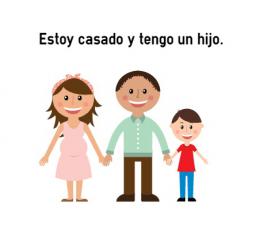Introduce yourself in Spanish
Sign up for free to get all information about private lessons and our available group courses (A1, A2, B2, B2, C1, C2)
Sign up for freeSign up for free to get all information about private lessons and our available group courses (A1, A2, B2, B2, C1, C2)
Sign up for freeOn this page you´ll learn how to ask and answer about:
Take online language lessons with a professional teacher
*Usted* in brackets means that pronouncing the word is optional. It expresses the politeness, but it could be omitted as the verb conjugation also shows the polite form.
| Spanish | English |
|---|---|
| ¿Cómo se llama (usted)? (formal) | What is your name? |
| ¿Cómo te llamas? | What is your name? |
| Me llamo Pablo. | My names is Pablo. |
| Soy Pablo. | I'm Pablo. |
| ¡Encantado! (male) | Nice to meet you. |
| ¡Encantada! (female) | Nice to meet you. |
Whilst in English we use the verb to be for talking about age, in Spanish we utilize tener (the Spanish equivalent of to have).
| Spanish | English |
|---|---|
| ¿Cuántos años tiene (usted)? (formal) | How old are you? |
| ¿Cuántos años tienes, Pablo? | How old are you, Pablo? |
| Tengo 25 años. | I'm 25 years old. |
While in English the nationalities are written with capital letters, in Spanish they remain with small letters.
| Spanish | English |
|---|---|
| ¿De dónde es (usted)? (formal) | Where are you from? |
| ¿De dónde eres? | Where are you from? |
| Soy de Francia. | I'm from France. |
| Soy francés. (male) | I´m French. |
| Soy francesa. (female) | I´m French. |
The Grammar construction Personal pronoun + verb in English is often changed in Spanish by just a verb without a personal pronoun construction. For example: I live in Paris = (yo) Vivo en Paris.
| Spanish | English |
|---|---|
| ¿Dónde vive (usted)? (formal) | Where do you live? |
| ¿Dónde vives, Pablo? | Where do you live, Pablo? |
| Vivo en París. | I live in Paris. |
As the Spanish adjectives vary in gender, we have the word casado (married) for masculine and casada for female gender .
| Spanish | English |
|---|---|
| ¿Está (usted) casado? (formal, male) | Are you married? |
| ¿Está (usted) casada? (formal, female) | Are you married? |
| ¿Estás casado? (informal, male) | Are you married? |
| ¿Estás casada? (informal, female) | Are you married? |
| Sí, estoy casado. (male) | Yes, I'm married. |
| Sí, estoy casada. (female) | Yes, I'm married. |
| No, estoy soltero. (male) | No, I'm single. |
| No, estoy soltera. (female) | No, I'm single. |
Look at the list of some professions below the table.
| Spanish | English |
|---|---|
| ¿A qué se dedica (usted)? | What do you do? |
| ¿Qué hace (usted)? (formal) | What do you do? |
| ¿A qué te dedicas? | What do you do? |
| ¿Qué haces? | What do you do? |
| Soy profesor. | I'm a teacher. |
| Spanish | English |
|---|---|
| azafata | stewardess |
| periodista | journalist |
| fotógrafo/a | photographer |
| traductor/a | translator |
| cantante | singer |
| bailarín/a | dancer |
| arqueólogo | archaeologist |
| diseñador | designer |
| escritor | writer |
Spanish word dirección could mean direction as well as address depending on the context. Here it is used with the meaning of address.
| Spanish | English |
|---|---|
| ¿Cuál es su número de teléfono? (formal) | What is your phone number? |
| ¿Cuál es su dirección? (formal) | What is you address? |
| ¿Cuál es su e-mail? (formal) | What is your e-mail? |
| ¿Cuál es tu número de teléfono? | What is your phone number? |
| ¿Cuál es tu dirección? | What is your address? |
| ¿Cuál es tu e-mail? | What is your e-mail? |
| Mi número de teléfono es 620 44 42 17. | My telephone number is 620 44 42 17. |
| Mi dirección es calle Buenos Aires 5. | My address is street Buenos Aires 5. |
| Mi correo electrónico es pablo@correo.es. | My e-mail is pablo@correo.es. |
Now we will assemble the previous introducing vocabulary in an example dialogue:
Dani: ¡Hola!, ¿Cómo se llama? Hello! What is your name?
Pablo: ¡Hola!, Soy Pablo. Hello! I'm Pablo.
Dani: ¿Cuántos años tiene Usted? How old are you?
Pablo: Tengo 25 años. I'm 25.
Dani: ¿A qué se dedica, Pablo? What do you do?
Pablo: Soy profesor de baile. I'm a dancing teacher.
Dani: Está Usted casado? Are you married?
Pablo: Sí, tengo un hijo. Yes, I have a child.

Now you can practice these kind of dialogues in person or with our exercises. And don´t forget the kisses in any event!
